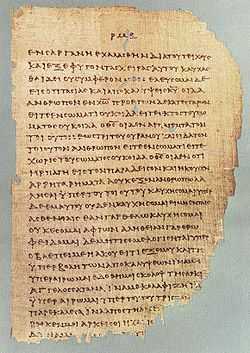2 Corinthians 8
| 2 Corinthians 8 | |
|---|---|
|
A folio of Papyrus 46 (written ca. AD 200), containing 2 Corinthians 11:33-12:9. This manuscript contains almost complete parts of the whole Pauline epistles. | |
| Book | Second Epistle to the Corinthians |
| Bible part | New Testament |
| Order in the Bible part | 8 |
| Category | Pauline epistles |
2 Corinthians 8 is the eighth chapter of the Second Epistle to the Corinthians in the New Testament of the Christian Bible. It is authored by Paul of Tarsus and Timothy.[1][2]
Text
- The original text is written in Koine Greek.
- Some most ancient manuscripts containing this chapter are:
- Papyrus 46 (ca. AD 200)
- Codex Vaticanus (AD 325-350)
- Codex Sinaiticus (AD 330-360)
- Codex Alexandrinus (ca. AD 400-440)
- Codex Ephraemi Rescriptus (ca. AD 450)
- Codex Freerianus (ca. AD 450; extant: verses 6-7,14-17,24)
- Codex Claromontanus (ca. AD 550)
- This chapter is divided into 24 verses.
Structure
This chapter can be grouped (with cross references to other parts of the Bible):
- 2 Corinthians 8:1-7 = Excel in Giving
- 2 Corinthians 8:8-15 = Christ Our Pattern
- 2 Corinthians 8:16-24 = Collection for the Judean Saints
Cross reference
Verse 9
- For you know the grace of our Lord Jesus Christ, that though He was rich, yet for your sakes He became poor, that you through His poverty might become rich.[3]
- For ye know the grace of our Lord Jesus
This is a new argument, and a very forcible one to engage to liberality, taken from the wonderful grace and love of Christ, displayed in his state of humiliation towards his people; which is well known to all them that have truly believed in Christ; of this they are not and cannot be ignorant, his love, good will, and favour are so manifest; there are such glaring proofs of it in his incarnation, sufferings, and death, that leave no room for any to doubt of it:[4]
- that though he was rich;
in the perfections of his divine nature, having the fulness of the Godhead in him, all that the Father has, and so equal to him; such as eternity, immutability, infinity and immensity, omnipresence, omniscience, omnipotence in the works of his hands, which reach to everything that is made, the heavens, the earth, the sea, and all that in them are, things visible and invisible; in his universal empire and dominion over all creature; and in those large revenues of glory, which are due to him from them all; which riches of his are underived from another, incommunicable to another, and cannot be lost:[4]
- yet for your sakes he became poor;
by assuming human nature, with all its weaknesses and imperfections excepting sin; he appeared in it not as a lord, but in the form of a servant; he endured in it a great deal of reproach and shame, and at last death itself; not that by becoming man he ceased to be God, or lost his divine perfections, thought these were much hid and covered from the view of man; and in his human nature he became the reverse of what he is in his divine nature, namely, finite and circumscriptible, weak and infirm, ignorant of some things, and mortal; in which nature also he was exposed to much meanness and outward poverty; he was born of poor parents, had no liberal education, was brought up to a trade, had not where to lay his head, was ministered to by others of their substance, and had nothing to bequeath his mother at his death, but commits her to the care of one of his disciples; all which fulfilled the prophecies of him, that he should be (ld) and (yne), "poor" and "low", ( Psalms 41:1 ) ( Zechariah 9:9 ) . The persons for whom he became so, were not the angels, but elect men; who were sinners and ungodly persons, and were thereby become bankrupts and beggars: the end for which he became poor for them was,[4]
- that they through his poverty might be rich;
not in temporals, but in spirituals; and by his obedience, sufferings, and death in his low estate, he has paid all their debts, wrought out a robe of righteousness, rich and adorned with jewels, with which he clothes them, and through his blood and sacrifice has made them kings and priests unto God. They are enriched by him with the graces of his Spirit; with the truths of the Gospel, comparable to gold, silver, and precious stones; with himself and all that he has; with the riches of grace here, and of glory hereafter. These are communicable from him, though unsearchable, and are solid and substantial, satisfying, lasting, and for ever. Now if this grace of Christ will not engage to liberality with cheerfulness, nothing will.[4]
See also
- Macedonia
- Titus
- Other related Bible parts: Luke 12, 2 Corinthians 9, Ephesians 1, Philippians 4, Hebrews 11, Revelation 3
References
- ↑ Halley, Henry H. Halley's Bible Handbook: an abbreviated Bible commentary. 23rd edition. Zondervan Publishing House. 1962.
- ↑ Holman Illustrated Bible Handbook. Holman Bible Publishers, Nashville, Tennessee. 2012.
- ↑ 2 Corinthians 8:9
- ↑ 4.0 4.1 4.2 4.3 John Gill's Exposition of the Entire Bible, 2 Corinthians 8:9
External links
| |||||||||||||||||||||||||||||
